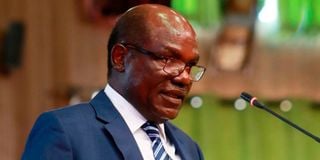By-elections in limbo after decision on IEBC quorum

IEBC Chairman Wafula Chebukati.
What you need to know:
- The by-elections for Juja and Bonchari seats together with Rurii ward (Nyandarua County) are slated for May 18.
- The commission also plans to hold by-election for Kiambaa parliamentary seat and Muguga ward (Kiambu County) on July 15.
The fate of five upcoming by-elections hangs in the balance following High Court’s declaration that the Independent Electoral and Boundaries Commission (IEBC) has no quorum to conduct its business.
Also in limbo are decisions made by the current three commissioners in preparation for the 2022 General Election, such as procurement of poll materials and hiring of staff.
The by-elections for Juja and Bonchari seats together with Rurii ward (Nyandarua County) are slated for May 18. The commission also plans to hold by-election for Kiambaa parliamentary seat and Muguga ward (Kiambu County) on July 15.
However, the High Court declared that since April 2018 when three IEBC commissioners – vice-chairperson Connie Nkatha Maina and commissioners Margaret Mwachanya and Paul Kurgat – resigned, the polls’ agency has been conducting its business without the requisite quorum of five commissioners.
Vocal commissioner Roselyne Akombe had resigned earlier in October 2017 days to the repeat presidential election, saying the commission had become a competition of political interests.
The exit of the four left only the chairperson Wafula Chebukati and two commissioners in office.
According to the five-judge bench, the Second Schedule of the IEBC Act provides that the quorum for the conduct of business at a meeting of the IEBC is at least five members.
Lack of quorum
“In our view, the statute is clear: the IEBC requires five commissioners to conduct any business. The statute does not distinguish between “policy” and other business,” said the judges.
They departed from an earlier holding by Justice Wilfrida Okwany, who had observed that conducting by-elections could not be affected by lack of quorum since it did not involve the making of policy decisions.
She held that the three members of the IEBC can conduct business other than making “policy decisions” when its membership is below the minimum five stipulated in paragraph 5 of the Second Schedule.
“The statute requires the IEBC to have the minimum of five commissioners in order to conduct any business. Period,” said the bench comprising of justices Teresia Matheka, George Odunga, Prof Joel Ngugi, Jairus Ngaah and Chacha Mwita.
Legal pundits yesterday said the ruling potentially has implication on decisions made by the polls’ commission, including the at least 19 by-elections (seven National Assembly and 11 wards) called and conducted by IEBC without the statutory quorum.
The National Assembly mini-polls include the one for Machakos and Migori senatorial seats as well as Msambweni, Matungu, Kabuchai, Kibra and Baringo South MP seats.
The wards include Hellsgate, London and Lake View wards in Nakuru County, Kiamokoma (Kisii), Huruma (Uasin Gishu), Gaturi (Murang’a), Kitise Kithuki (Makueni), Kahawa Wendani (Kiambu), Ganda (Kilifi), Dabaso (Kilifi), Ruguru (Nyeri) and Kisumu North (Kisumu).
Legal challenges
Lawyer Charles Kanjama said the IEBC could face legal hurdles and challenges if the judgment is interpreted to mean that the commissioners’ quorum was not only needed in handling of the BBI referedum but was also mandatory when making other decisions, including calling of by-elections.
“However, there is a legal principle called doctrine of necessity. It may allow IEBC to take certain decisions because of constitutional timelines. That doctrine could rescue decisions made by IEBC without the quorum,” said Mr Kanjama.
He added that another interpretation of the judgment could mean that it only applies to the issues that were being litigated in court – BBI referendum.
Lawyer Jackson Awele said the judges’ interpretation on the issue of quorum at agency is based on the statute (IEBC) not the constitution.
On the other hand, Prof Tom Ojienda said in the face of the judgment, IEBC is staring at a litany of litigations.
In his view, President Uhuru Kenyatta’s delay to fill the four vacancies at the commission is the cause of the legal challenges that have visited the agency.
He observed the court’s ruling could be taken to mean it invalidated all decisions made by the current three commissioners and not only the issue of the verification of BBI signatures.





